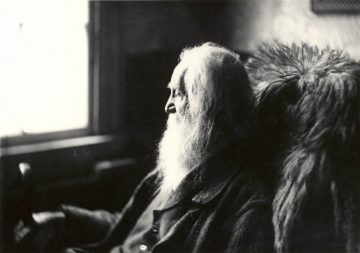Mark Doty at The Paris Review:
 There are poets who find their strength in brevity, who use as few words as possible, arranged in the minimum number of lines, to evoke sense perception, emotion, and idea. Walt Whitman, it goes without saying, is not one of those. He is most comfortable on a broader scale. His great poems—“Song of Myself,” “The Sleepers,” “Crossing Brooklyn Ferry,” “Out of the Cradle Endlessly Rocking,” and “When Lilacs Last in the Dooryard Bloomed”—straddle hundreds of lines, providing the poet with room to catalogue particulars (The glories strung like beads on my smallest sights and hearings, he calls them), to stack up parallel statements, to address his reader, to depart from and return to his argument, and to construct a kind of poetic architecture designed to be mimetic of the process of thinking, and thus draw us more intimately near. This is why his shorter poems often feel like parts of a larger, more encompassing one; even satisfyingly complete shorter pieces such as “To You” and “This Compost” might be seen as outtakes, or gestures in the direction of some overarching intention.
There are poets who find their strength in brevity, who use as few words as possible, arranged in the minimum number of lines, to evoke sense perception, emotion, and idea. Walt Whitman, it goes without saying, is not one of those. He is most comfortable on a broader scale. His great poems—“Song of Myself,” “The Sleepers,” “Crossing Brooklyn Ferry,” “Out of the Cradle Endlessly Rocking,” and “When Lilacs Last in the Dooryard Bloomed”—straddle hundreds of lines, providing the poet with room to catalogue particulars (The glories strung like beads on my smallest sights and hearings, he calls them), to stack up parallel statements, to address his reader, to depart from and return to his argument, and to construct a kind of poetic architecture designed to be mimetic of the process of thinking, and thus draw us more intimately near. This is why his shorter poems often feel like parts of a larger, more encompassing one; even satisfyingly complete shorter pieces such as “To You” and “This Compost” might be seen as outtakes, or gestures in the direction of some overarching intention.
more here.
